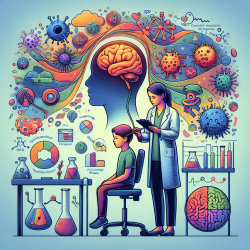Introduction
In the realm of special education, understanding the intricate relationship between sleep and affect regulation is pivotal for practitioners aiming to enhance their therapeutic strategies. The comprehensive review titled The role of objective sleep in implicit and explicit affect regulation sheds light on how sleep, particularly REM sleep, influences both implicit-automatic and explicit-controlled affect regulation processes. This blog delves into the implications of these findings for special education professionals and encourages further exploration in this vital area.
Understanding Affect Regulation
Affect regulation is the process of identifying, evaluating, and modifying emotional responses. It can be categorized into implicit-automatic regulation, which occurs unconsciously, and explicit-controlled regulation, which involves deliberate and conscious efforts to change one's emotional state. Both types are crucial in managing mental health conditions like PTSD and depression.
The Role of Sleep in Affect Regulation
The review highlights that sleep, especially REM sleep, plays a significant role in affect regulation. For implicit-automatic processes such as fear extinction and safety learning, REM sleep is critical. Disruptions in REM sleep can impair these processes, potentially exacerbating symptoms of anxiety and PTSD.
In terms of explicit-controlled regulation, strategies like cognitive reappraisal and expressive suppression are influenced by sleep quality. While findings are mixed, there is evidence that sleep deprivation can hinder the ability to effectively employ these strategies, impacting emotional well-being.
Implications for Special Education Practitioners
For practitioners in special education, these insights underscore the importance of considering sleep quality in therapeutic interventions. Here are some practical applications:
- Incorporate Sleep Education: Educate students and parents about the importance of sleep and its impact on emotional regulation and learning.
- Monitor Sleep Patterns: Use tools like sleep diaries or wearable technology to track students' sleep patterns and identify potential disruptions.
- Collaborate with Healthcare Providers: Work with healthcare professionals to address sleep-related issues that may affect students' emotional and cognitive functioning.
- Integrate Sleep-Enhancing Strategies: Implement classroom activities that promote relaxation and better sleep, such as mindfulness exercises or quiet time.
Encouraging Further Research
While the review provides valuable insights, it also highlights the need for further research, particularly in exploring the causal relationships between sleep and affect regulation. Special education practitioners are encouraged to engage in or support research initiatives that investigate these connections, potentially leading to more effective interventions for students with emotional and behavioral challenges.
Conclusion
Understanding the interplay between sleep and affect regulation is crucial for special education practitioners. By incorporating sleep-focused strategies into their practice and advocating for further research, practitioners can enhance their ability to support students' emotional and cognitive development.
To read the original research paper, please follow this link: The role of objective sleep in implicit and explicit affect regulation: A comprehensive review.










